Evaluating the Impact of Brexit on Health & Social Care Services
VerifiedAdded on 2024/05/16
|6
|1309
|148
Report
AI Summary
This report provides an analysis of the impact of Brexit on the health and social care sector in the United Kingdom. It evaluates the extent to which local attitudes reflect national-level concerns, focusing on key issues such as staffing shortages due to changes in freedom of movement, the need for revised regulations related to working hours and medicine, and the financial implications for the NHS. The report also assesses the validity of public attitudes and behaviors concerning privatization, resource reduction, changing service criteria, and potential discrimination within healthcare services. Furthermore, it justifies the possible consequences of contemporary thinking on health and social care provision, including the pressures on the NHS, potential changes in working hour regulations, and the critical issue of funding. The analysis highlights how these factors can affect the quality of patient care and diagnosis within the UK healthcare system.
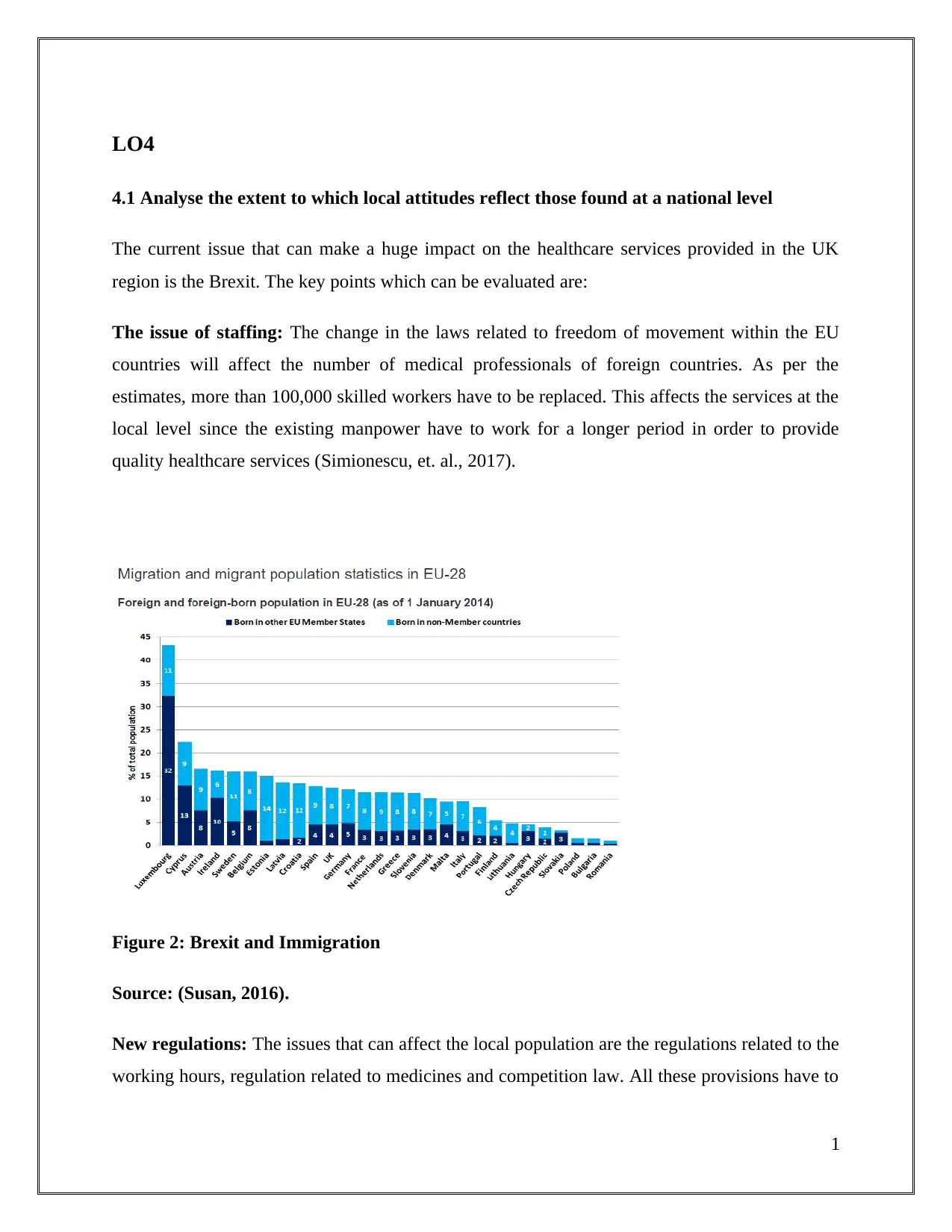
LO4
4.1 Analyse the extent to which local attitudes reflect those found at a national level
The current issue that can make a huge impact on the healthcare services provided in the UK
region is the Brexit. The key points which can be evaluated are:
The issue of staffing: The change in the laws related to freedom of movement within the EU
countries will affect the number of medical professionals of foreign countries. As per the
estimates, more than 100,000 skilled workers have to be replaced. This affects the services at the
local level since the existing manpower have to work for a longer period in order to provide
quality healthcare services (Simionescu, et. al., 2017).
Figure 2: Brexit and Immigration
Source: (Susan, 2016).
New regulations: The issues that can affect the local population are the regulations related to the
working hours, regulation related to medicines and competition law. All these provisions have to
1
4.1 Analyse the extent to which local attitudes reflect those found at a national level
The current issue that can make a huge impact on the healthcare services provided in the UK
region is the Brexit. The key points which can be evaluated are:
The issue of staffing: The change in the laws related to freedom of movement within the EU
countries will affect the number of medical professionals of foreign countries. As per the
estimates, more than 100,000 skilled workers have to be replaced. This affects the services at the
local level since the existing manpower have to work for a longer period in order to provide
quality healthcare services (Simionescu, et. al., 2017).
Figure 2: Brexit and Immigration
Source: (Susan, 2016).
New regulations: The issues that can affect the local population are the regulations related to the
working hours, regulation related to medicines and competition law. All these provisions have to
1
Paraphrase This Document
Need a fresh take? Get an instant paraphrase of this document with our AI Paraphraser
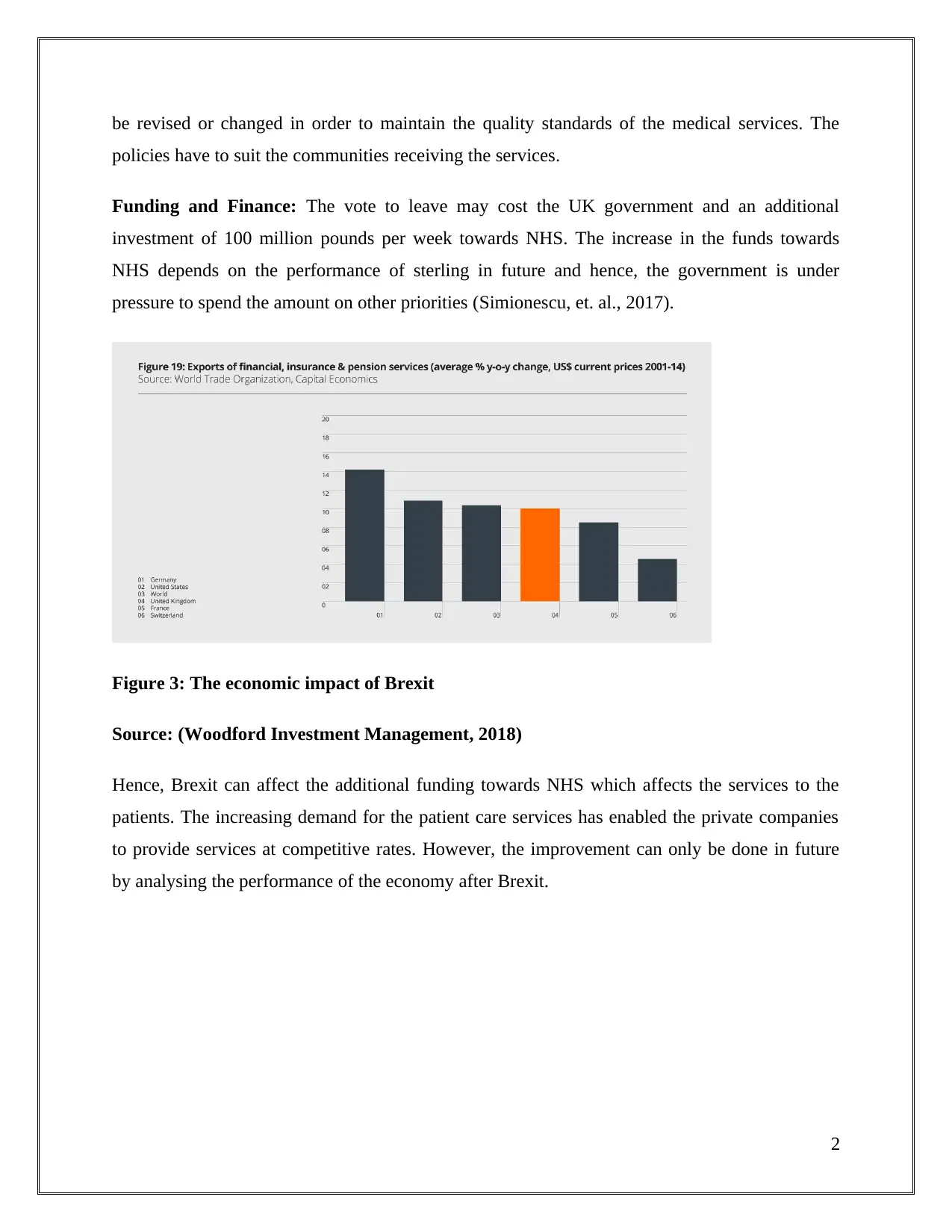
be revised or changed in order to maintain the quality standards of the medical services. The
policies have to suit the communities receiving the services.
Funding and Finance: The vote to leave may cost the UK government and an additional
investment of 100 million pounds per week towards NHS. The increase in the funds towards
NHS depends on the performance of sterling in future and hence, the government is under
pressure to spend the amount on other priorities (Simionescu, et. al., 2017).
Figure 3: The economic impact of Brexit
Source: (Woodford Investment Management, 2018)
Hence, Brexit can affect the additional funding towards NHS which affects the services to the
patients. The increasing demand for the patient care services has enabled the private companies
to provide services at competitive rates. However, the improvement can only be done in future
by analysing the performance of the economy after Brexit.
2
policies have to suit the communities receiving the services.
Funding and Finance: The vote to leave may cost the UK government and an additional
investment of 100 million pounds per week towards NHS. The increase in the funds towards
NHS depends on the performance of sterling in future and hence, the government is under
pressure to spend the amount on other priorities (Simionescu, et. al., 2017).
Figure 3: The economic impact of Brexit
Source: (Woodford Investment Management, 2018)
Hence, Brexit can affect the additional funding towards NHS which affects the services to the
patients. The increasing demand for the patient care services has enabled the private companies
to provide services at competitive rates. However, the improvement can only be done in future
by analysing the performance of the economy after Brexit.
2
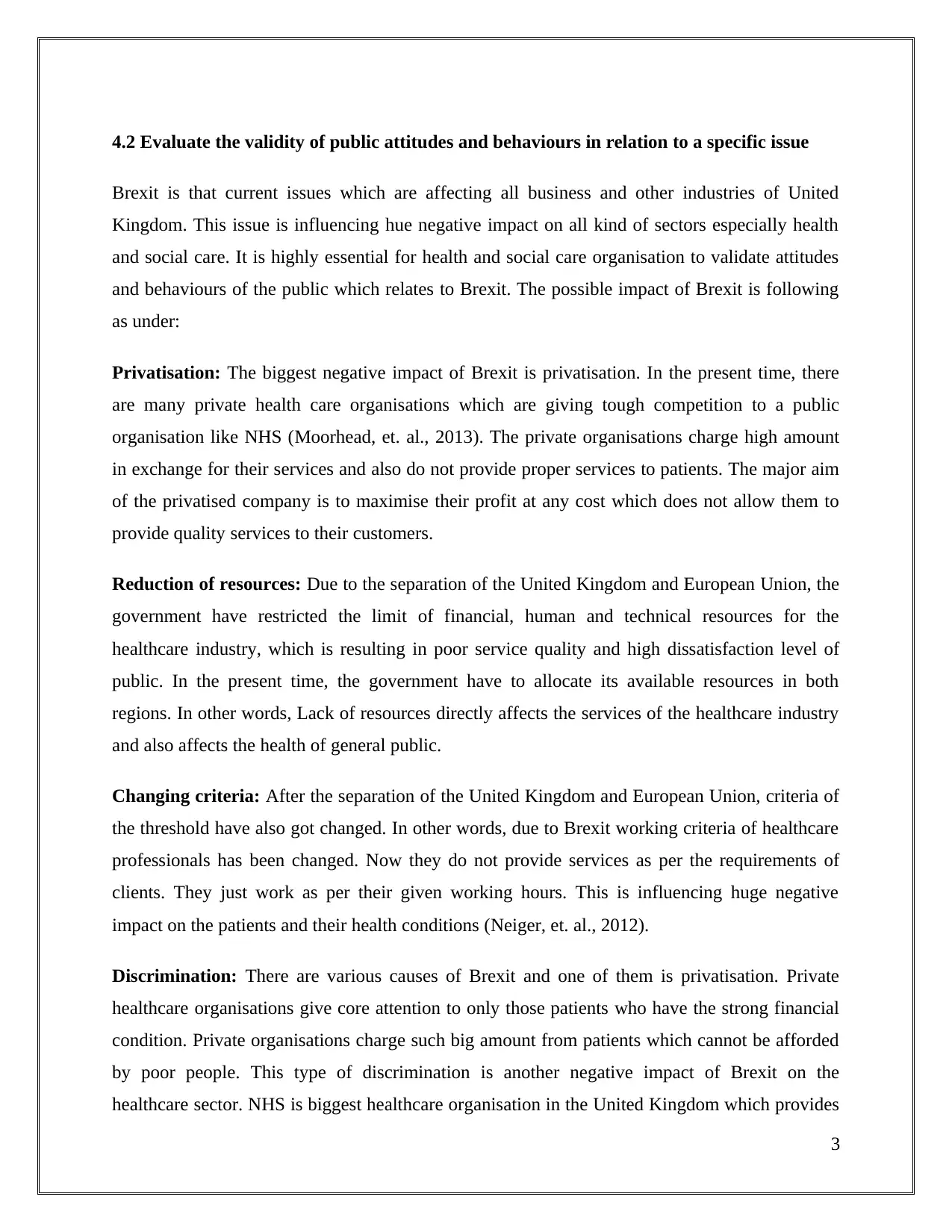
4.2 Evaluate the validity of public attitudes and behaviours in relation to a specific issue
Brexit is that current issues which are affecting all business and other industries of United
Kingdom. This issue is influencing hue negative impact on all kind of sectors especially health
and social care. It is highly essential for health and social care organisation to validate attitudes
and behaviours of the public which relates to Brexit. The possible impact of Brexit is following
as under:
Privatisation: The biggest negative impact of Brexit is privatisation. In the present time, there
are many private health care organisations which are giving tough competition to a public
organisation like NHS (Moorhead, et. al., 2013). The private organisations charge high amount
in exchange for their services and also do not provide proper services to patients. The major aim
of the privatised company is to maximise their profit at any cost which does not allow them to
provide quality services to their customers.
Reduction of resources: Due to the separation of the United Kingdom and European Union, the
government have restricted the limit of financial, human and technical resources for the
healthcare industry, which is resulting in poor service quality and high dissatisfaction level of
public. In the present time, the government have to allocate its available resources in both
regions. In other words, Lack of resources directly affects the services of the healthcare industry
and also affects the health of general public.
Changing criteria: After the separation of the United Kingdom and European Union, criteria of
the threshold have also got changed. In other words, due to Brexit working criteria of healthcare
professionals has been changed. Now they do not provide services as per the requirements of
clients. They just work as per their given working hours. This is influencing huge negative
impact on the patients and their health conditions (Neiger, et. al., 2012).
Discrimination: There are various causes of Brexit and one of them is privatisation. Private
healthcare organisations give core attention to only those patients who have the strong financial
condition. Private organisations charge such big amount from patients which cannot be afforded
by poor people. This type of discrimination is another negative impact of Brexit on the
healthcare sector. NHS is biggest healthcare organisation in the United Kingdom which provides
3
Brexit is that current issues which are affecting all business and other industries of United
Kingdom. This issue is influencing hue negative impact on all kind of sectors especially health
and social care. It is highly essential for health and social care organisation to validate attitudes
and behaviours of the public which relates to Brexit. The possible impact of Brexit is following
as under:
Privatisation: The biggest negative impact of Brexit is privatisation. In the present time, there
are many private health care organisations which are giving tough competition to a public
organisation like NHS (Moorhead, et. al., 2013). The private organisations charge high amount
in exchange for their services and also do not provide proper services to patients. The major aim
of the privatised company is to maximise their profit at any cost which does not allow them to
provide quality services to their customers.
Reduction of resources: Due to the separation of the United Kingdom and European Union, the
government have restricted the limit of financial, human and technical resources for the
healthcare industry, which is resulting in poor service quality and high dissatisfaction level of
public. In the present time, the government have to allocate its available resources in both
regions. In other words, Lack of resources directly affects the services of the healthcare industry
and also affects the health of general public.
Changing criteria: After the separation of the United Kingdom and European Union, criteria of
the threshold have also got changed. In other words, due to Brexit working criteria of healthcare
professionals has been changed. Now they do not provide services as per the requirements of
clients. They just work as per their given working hours. This is influencing huge negative
impact on the patients and their health conditions (Neiger, et. al., 2012).
Discrimination: There are various causes of Brexit and one of them is privatisation. Private
healthcare organisations give core attention to only those patients who have the strong financial
condition. Private organisations charge such big amount from patients which cannot be afforded
by poor people. This type of discrimination is another negative impact of Brexit on the
healthcare sector. NHS is biggest healthcare organisation in the United Kingdom which provides
3
⊘ This is a preview!⊘
Do you want full access?
Subscribe today to unlock all pages.

Trusted by 1+ million students worldwide
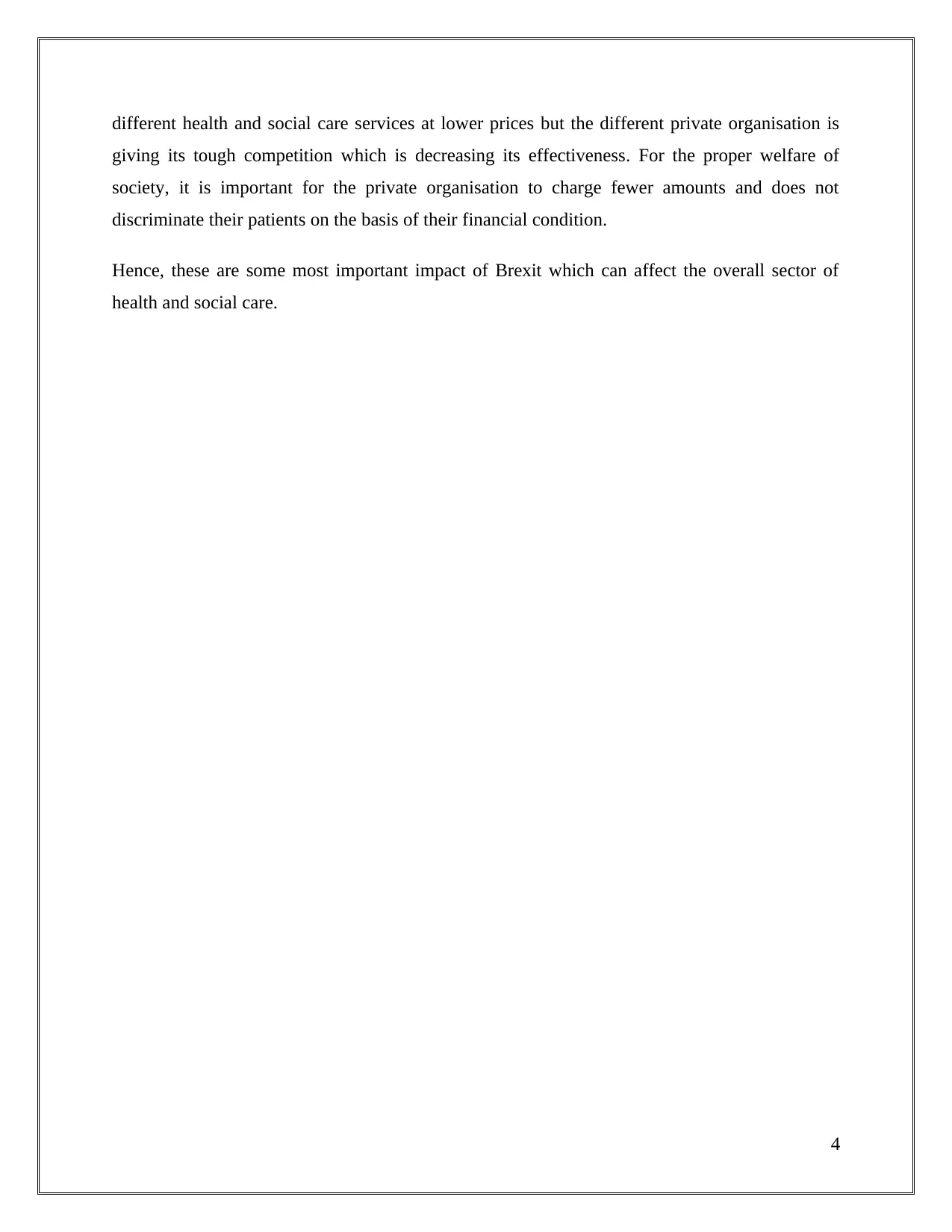
different health and social care services at lower prices but the different private organisation is
giving its tough competition which is decreasing its effectiveness. For the proper welfare of
society, it is important for the private organisation to charge fewer amounts and does not
discriminate their patients on the basis of their financial condition.
Hence, these are some most important impact of Brexit which can affect the overall sector of
health and social care.
4
giving its tough competition which is decreasing its effectiveness. For the proper welfare of
society, it is important for the private organisation to charge fewer amounts and does not
discriminate their patients on the basis of their financial condition.
Hence, these are some most important impact of Brexit which can affect the overall sector of
health and social care.
4
Paraphrase This Document
Need a fresh take? Get an instant paraphrase of this document with our AI Paraphraser
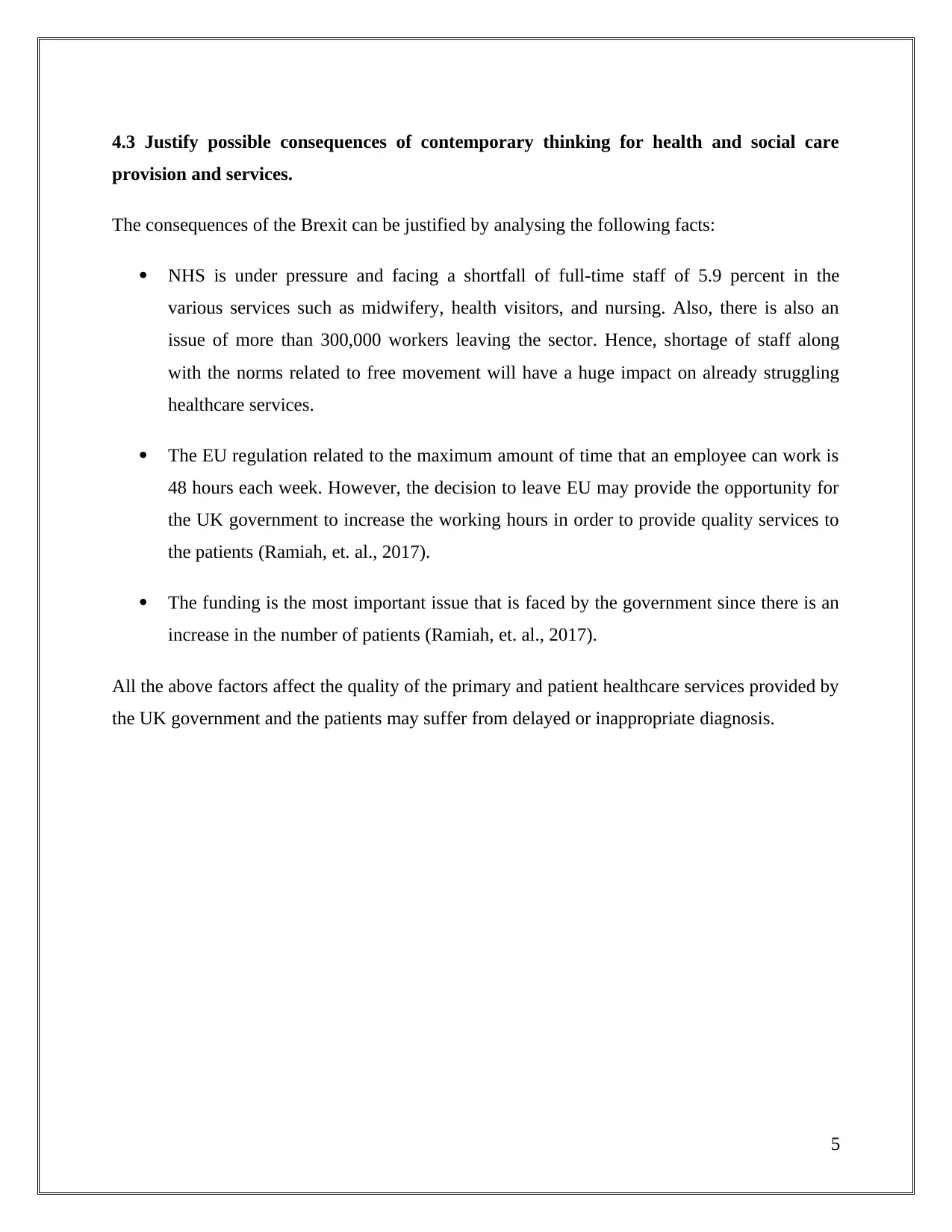
4.3 Justify possible consequences of contemporary thinking for health and social care
provision and services.
The consequences of the Brexit can be justified by analysing the following facts:
NHS is under pressure and facing a shortfall of full-time staff of 5.9 percent in the
various services such as midwifery, health visitors, and nursing. Also, there is also an
issue of more than 300,000 workers leaving the sector. Hence, shortage of staff along
with the norms related to free movement will have a huge impact on already struggling
healthcare services.
The EU regulation related to the maximum amount of time that an employee can work is
48 hours each week. However, the decision to leave EU may provide the opportunity for
the UK government to increase the working hours in order to provide quality services to
the patients (Ramiah, et. al., 2017).
The funding is the most important issue that is faced by the government since there is an
increase in the number of patients (Ramiah, et. al., 2017).
All the above factors affect the quality of the primary and patient healthcare services provided by
the UK government and the patients may suffer from delayed or inappropriate diagnosis.
5
provision and services.
The consequences of the Brexit can be justified by analysing the following facts:
NHS is under pressure and facing a shortfall of full-time staff of 5.9 percent in the
various services such as midwifery, health visitors, and nursing. Also, there is also an
issue of more than 300,000 workers leaving the sector. Hence, shortage of staff along
with the norms related to free movement will have a huge impact on already struggling
healthcare services.
The EU regulation related to the maximum amount of time that an employee can work is
48 hours each week. However, the decision to leave EU may provide the opportunity for
the UK government to increase the working hours in order to provide quality services to
the patients (Ramiah, et. al., 2017).
The funding is the most important issue that is faced by the government since there is an
increase in the number of patients (Ramiah, et. al., 2017).
All the above factors affect the quality of the primary and patient healthcare services provided by
the UK government and the patients may suffer from delayed or inappropriate diagnosis.
5
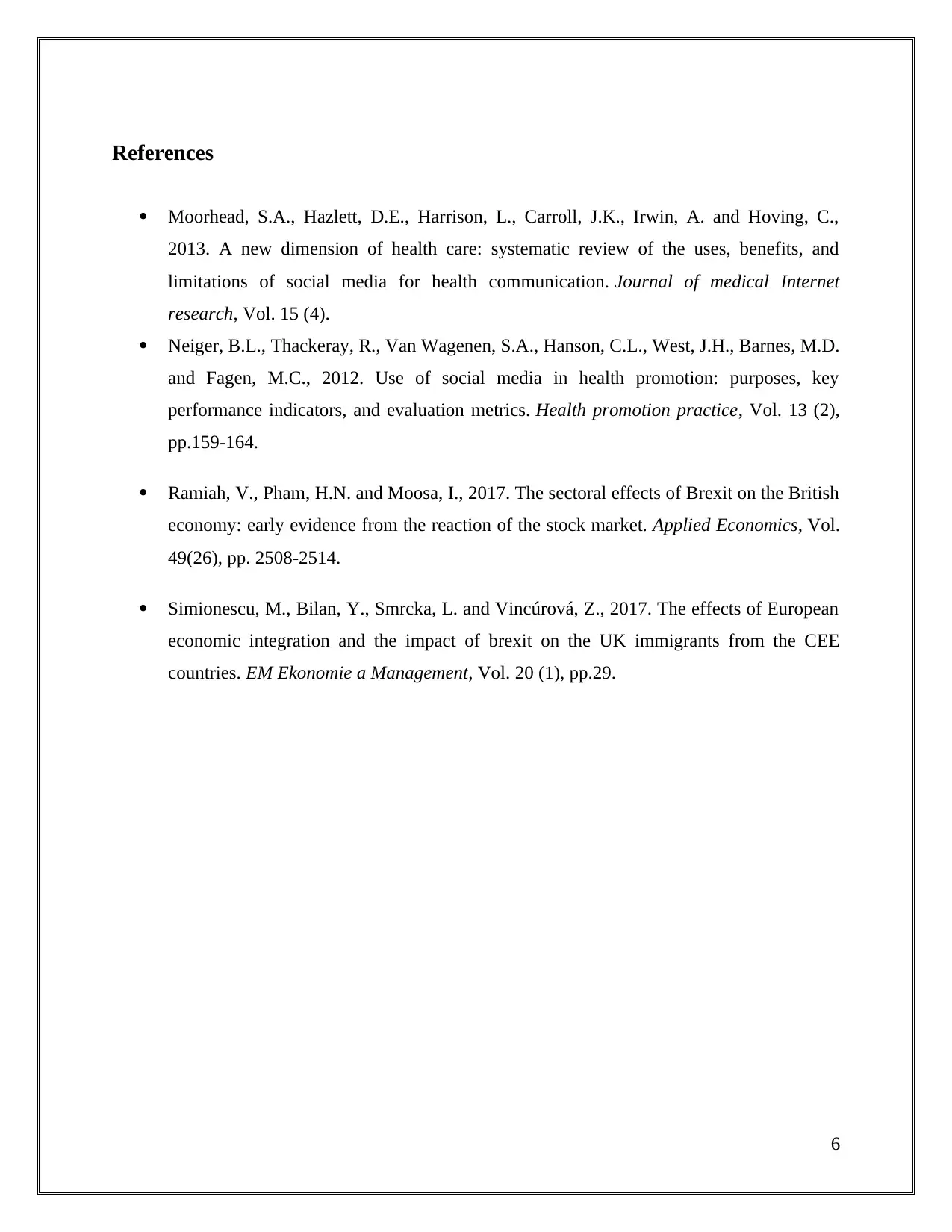
References
Moorhead, S.A., Hazlett, D.E., Harrison, L., Carroll, J.K., Irwin, A. and Hoving, C.,
2013. A new dimension of health care: systematic review of the uses, benefits, and
limitations of social media for health communication. Journal of medical Internet
research, Vol. 15 (4).
Neiger, B.L., Thackeray, R., Van Wagenen, S.A., Hanson, C.L., West, J.H., Barnes, M.D.
and Fagen, M.C., 2012. Use of social media in health promotion: purposes, key
performance indicators, and evaluation metrics. Health promotion practice, Vol. 13 (2),
pp.159-164.
Ramiah, V., Pham, H.N. and Moosa, I., 2017. The sectoral effects of Brexit on the British
economy: early evidence from the reaction of the stock market. Applied Economics, Vol.
49(26), pp. 2508-2514.
Simionescu, M., Bilan, Y., Smrcka, L. and Vincúrová, Z., 2017. The effects of European
economic integration and the impact of brexit on the UK immigrants from the CEE
countries. EM Ekonomie a Management, Vol. 20 (1), pp.29.
6
Moorhead, S.A., Hazlett, D.E., Harrison, L., Carroll, J.K., Irwin, A. and Hoving, C.,
2013. A new dimension of health care: systematic review of the uses, benefits, and
limitations of social media for health communication. Journal of medical Internet
research, Vol. 15 (4).
Neiger, B.L., Thackeray, R., Van Wagenen, S.A., Hanson, C.L., West, J.H., Barnes, M.D.
and Fagen, M.C., 2012. Use of social media in health promotion: purposes, key
performance indicators, and evaluation metrics. Health promotion practice, Vol. 13 (2),
pp.159-164.
Ramiah, V., Pham, H.N. and Moosa, I., 2017. The sectoral effects of Brexit on the British
economy: early evidence from the reaction of the stock market. Applied Economics, Vol.
49(26), pp. 2508-2514.
Simionescu, M., Bilan, Y., Smrcka, L. and Vincúrová, Z., 2017. The effects of European
economic integration and the impact of brexit on the UK immigrants from the CEE
countries. EM Ekonomie a Management, Vol. 20 (1), pp.29.
6
⊘ This is a preview!⊘
Do you want full access?
Subscribe today to unlock all pages.

Trusted by 1+ million students worldwide
1 out of 6
Related Documents
Your All-in-One AI-Powered Toolkit for Academic Success.
+13062052269
info@desklib.com
Available 24*7 on WhatsApp / Email
![[object Object]](/_next/static/media/star-bottom.7253800d.svg)
Unlock your academic potential
Copyright © 2020–2026 A2Z Services. All Rights Reserved. Developed and managed by ZUCOL.





